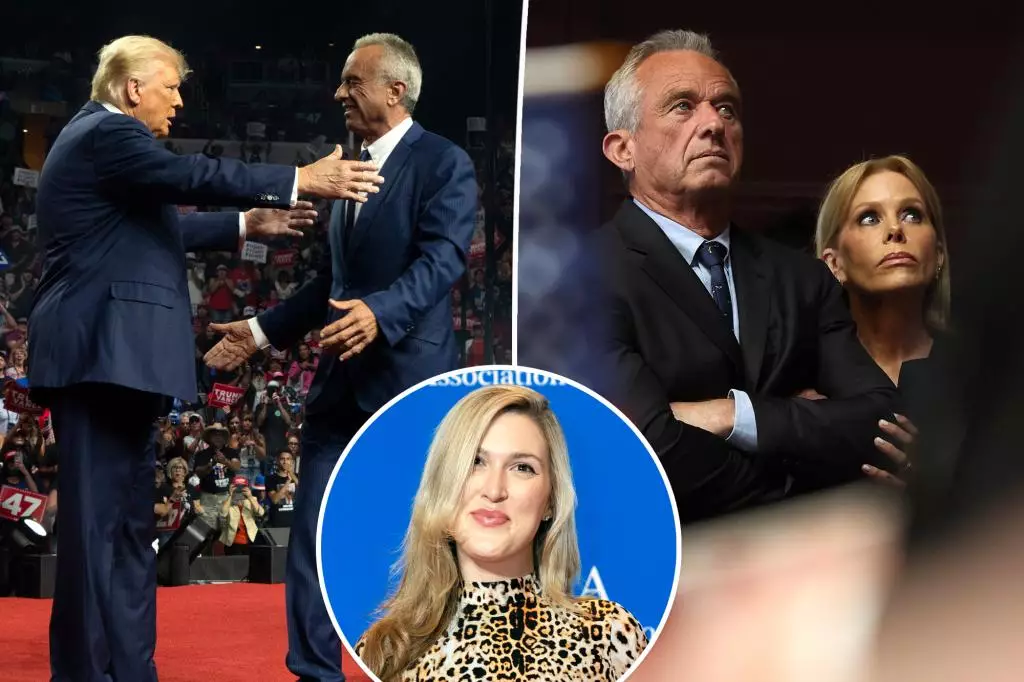In the volatile intersection of politics and personal life, Robert F. Kennedy Jr. has found himself embroiled in controversy following revelations of a scandalous relationship with New York Magazine’s Olivia Nuzzi. This development has not only attracted media attention but has also prompted three other women to come forward with their own allegations of romantic entanglements with Kennedy. Despite the sensational nature of these claims, insiders suggest that such scandals may not significantly hinder Kennedy’s political ambitions, particularly if Donald Trump secures another term in office.
The political landscape has dramatically transformed over the past decade, with traditional taboos surrounding personal misconduct distinctly fading. Inside sources indicate a shift in Republican ideology, distancing itself from the ethical puritanism reminiscent of earlier conservative leaders like George W. Bush. “People have evolved,” one GOP insider noted, emphasizing that the party is no longer inclined to scrutinize personal relationships when focusing on broader political strategies.
In many political circles, scandals are often considered minor inconveniences when compared to the overarching goal of gaining and maintaining power. Apparently, Kennedy’s alleged affairs, which might be viewed as scandalous to some, are hardly registering on the political Richter scale. Speculations indicate that Trump’s inner circle is less concerned about Kennedy’s romantic escapades than about his capacity to deliver votes or influence public opinion. “In D.C., this is barely a scandal,” one political analyst remarked, indicating a pragmatic approach among today’s political figures.
This evolving mindset suggests a culture shift that prioritizes political gain over personal conduct. While Kennedy has indeed faced scrutiny, especially due to his public endorsement of Trump after dropping out of the presidential race, the prevailing sentiment among GOP insiders seems categorically unconcerned with his private life. As stated by another source, “If there are issues, it’s not his relationships. Who even cares?”
Not all angles are as forgiving, however. Though many insiders believe that Kennedy’s alleged indiscretions won’t obstruct his political agenda, there are legitimate concerns regarding the potential complications for security clearance associated with such relationships. Some argue that these personal matters might expose Kennedy to vulnerabilities, including blackmail, if his entanglements are substantiated. Nonetheless, eagle-eyed observers also contend that many positions within the government do not necessitate a security clearance, indicating there could still be a pathway for Kennedy to assume a significant role.
Kennedy’s public denial of the romantic relationship with Nuzzi raises further questions about credibility and perception. His defense, claiming to have had no relationships outside of his marriage, contrasts sharply with the narrative painted by various sources. This tension illustrates a central dilemma in modern politics: the clash between public persona and private actions.
As Kennedy navigates the storm, Nuzzi’s situation exemplifies the intricate dynamics between the media and political figures, especially in an era where personal stories and relationships can dominate headlines. New York Magazine’s decision to place the reporter on leave pending an internal investigation speaks to the seriousness with which media outlets approach potential conflicts of interest. Meanwhile, speculation about the nature of Kennedy’s relationship with Nuzzi—including hints of “FaceTime sex” and mutual declarations of love—paints a picture of a man entangled both romantically and politically.
Moreover, Kennedy’s wife, actress Cheryl Hines, reportedly grappling with the fallout creates additional layers of intrigue. Sources indicate that her displeasure with Kennedy’s public political alignment and personal conduct is substantial, potentially adding stress to an already complicated marriage.
The parallels with Donald Trump’s myriad controversies—including accusations of infidelity and subsequent legal challenges—underline a shared narrative that seems almost endemic to political figures. Trump’s past indiscretions, which have been widely reported and sometimes litigated, serve as a reference point for understanding how much personal conduct influences public perception in the realm of politics.
With Kennedy now facing the possibility of his romantic past coming under scrutiny, the discourse centers on whether voters truly care about the private lives of their political leaders. If the prevailing sentiment is indeed one of apathy toward personal affairs, it raises critical questions about accountability and ethical standards within political spheres moving forward.
The interplay of personal life and public service is undeniably complex. As scandal unfolds and new allegations arise, only time will tell how Robert F. Kennedy Jr. will reconcile his political aspirations with the realities of his personal conduct.

